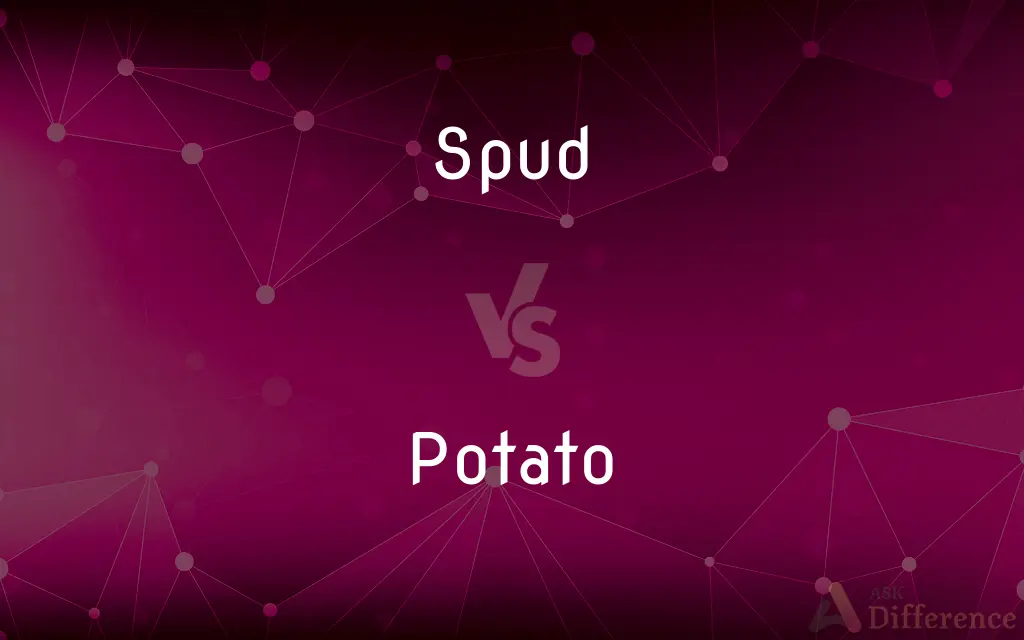Spud vs. Potato — What's the Difference?
By Tayyaba Rehman & Maham Liaqat — Updated on March 26, 2024
A spud is a colloquial term for a potato, which is a starchy tuber of the plant Solanum tuberosum.

Difference Between Spud and Potato
Table of Contents
ADVERTISEMENT
Key Differences
Both "spud" and "potato" refer to the same edible tuber, but "spud" is an informal or slang term, while "potato" is the standard term used in culinary and agricultural contexts.
Spuds are known for their versatility in cooking, appearing in dishes like mashed potatoes and fries. Similarly, potatoes are a staple food in many cultures, valued for their nutritional content and culinary flexibility.
The term "spud" often carries a more casual or humorous connotation, used colloquially in various English-speaking regions. On the other hand, "potato" is universally recognized and used in both formal and informal settings.
In historical contexts, "spud" once referred to a type of spade or shovel used for digging up potatoes. The term "potato," however, has origins in the Spanish word "patata," reflecting the crop's introduction to Europe via the Spanish.
Comparison Chart
Definition
Informal term for potato.
The starchy tuber of the plant Solanum tuberosum.
ADVERTISEMENT
Usage
Colloquial, informal.
Standard, formal and informal.
Context
Casual or humorous discussions.
Culinary, agricultural, general discussions.
Origin of Term
Originally referred to a spade for digging up potatoes.
Derived from the Spanish "patata".
Nutritional Value
Identical to potato.
High in carbohydrates, fiber, and vitamins.
Compare with Definitions
Spud
Spud is a slang term for the potato, often used in informal conversations.
We’re having spuds with dinner tonight.
Potato
Potatoes are a staple food, central to many dishes worldwide.
From mashed potatoes to fries, this vegetable is incredibly versatile.
Spud
The term spud has a casual, sometimes humorous connotation.
I could eat spuds in any form—boiled, baked, or fried!
Potato
Potato is the standard term for this starchy tuber, used globally.
Potatoes are a key ingredient in this recipe.
Spud
Spuds are celebrated for their culinary versatility, similar to potatoes.
She makes the best spud salad.
Potato
The name potato comes from the Spanish "patata."
The potato was introduced to Europe by the Spanish in the 16th century.
Spud
Spuds, being potatoes, are nutritious and a staple food in many diets.
Spuds are a good source of vitamin C and potassium.
Potato
The term potato is appropriate in both formal and informal contexts.
The menu offers a variety of potato-based dishes.
Spud
Spud once referred to the tool used for potato digging.
Farmers used a spud to harvest their potato crops.
Potato
Potatoes are nutritious, providing carbohydrates, fiber, and vitamins.
Potatoes are a dietary staple rich in nutrients.
Spud
(Informal) A potato.
Potato
The potato is a root vegetable native to the Americas, a starchy tuber of the plant Solanum tuberosum, and the plant itself is a perennial in the nightshade family, Solanaceae.Wild potato species, originating in modern-day Peru, can be found throughout the Americas, from Canada to southern Chile. The potato was originally believed to have been domesticated by Native Americans independently in multiple locations, but later genetic testing of the wide variety of cultivars and wild species traced a single origin for potatoes, in the area of present-day southern Peru and extreme northwestern Bolivia.
Spud
A sharp spadelike tool used for rooting or digging out weeds.
Potato
A starchy plant tuber which is one of the most important food crops, cooked and eaten as a vegetable
Roast potatoes
Mashed potato
Spud
A short section of pipe or a threaded fitting that completes a connection, as between a longer pipe and a nozzle, valve, or meter.
Potato
The plant of the nightshade family which produces potatoes on underground runners.
Spud
To remove with a sharp spadelike tool.
Potato
A large hole in a sock or stocking, especially one in the heel.
Spud
To begin drilling operations on
Spud an oil well.
Potato
A perennial plant (Solanum tuberosum) in the nightshade family that was first cultivated in South America and is widely grown for its starchy edible tubers.
Spud
(informal) A potato.
Potato
A tuber of this plant.
Spud
(informal) A hole in a sock.
Potato
Any of various wild plants in the genus Solanum that are similar to the cultivated potato.
Spud
A type of short nut (fastener) threaded on both ends.
Potato
A sweet potato. See Note at tater.
Spud
(obsolete) Anything short and thick.
Potato
The tuber of a plant, Solanum tuberosum, eaten as a starchy vegetable, particularly in the Americas and Europe; this plant.
Spud
A piece of dough boiled in fat.
Potato
A conspicuous hole in a sock or stocking.
Spud
A testicle.
Potato
Metaphor for a person or thing of little value.
Spud
(obsolete) A dagger.
Potato
A mentally handicapped person.
Spud
A digging fork with three broad prongs.
Potato
(humorous) A camera that takes poor-quality pictures.
Spud
A tool, similar to a spade, used for digging out weeds etc.
Potato
An underpowered computer or other device, especially when small in size.
Spud
A barking spud; a long-handled tool for removing bark from logs.
Potato
Underpowered; low-end.
I'd've captured a video of my playthrough rather than just screenshots, but my computer's too potato to comfortably run the game and a video-capture program at the same time.
Spud
A short central rod in a lighting fixture, for attachment to the light.
Potato
A plant (Solanum tuberosum) of the Nightshade family, and its esculent farinaceous tuber, of which there are numerous varieties used for food. It is native of South America, but a form of the species is found native as far north as New Mexico.
Spud
To dig up weeds with a spud.
Potato
An edible tuber native to South America; a staple food of Ireland
Spud
(drilling) To begin drilling an oil well; to drill by moving the drill bit and shaft up and down, or by raising and dropping a bit.
Potato
Annual native to South America having underground stolons bearing edible starchy tubers; widely cultivated as a garden vegetable; vines are poisonous
Spud
(roofing) To remove the roofing aggregate and most of the bituminous top coating by scraping and chipping.
Spud
(camping) To set up a recreational vehicle (RV) at a campsite, typically by leveling the RV and connecting it to electric, water, and/or sewer hookups.
Spud
A game for three or more players, involving the gradual elimination of players by throwing and catching a ball.
Spud
A sharp, narrow spade, usually with a long handle, used by farmers for digging up large-rooted weeds; a similarly shaped implement used for various purposes.
My spud these nettles from the stone can part.
Spud
A dagger.
Spud
Anything short and thick; specifically, a piece of dough boiled in fat.
Spud
A potato.
Spud
An edible tuber native to South America; a staple food of Ireland
Spud
A sharp hand shovel for digging out roots and weeds
Spud
Initiate onsite drilling operations, as for petroleum;
The well was spudded in April
Spud
Produce buds, branches, or germinate;
The potatoes sprouted
Common Curiosities
Why do people call potatoes spuds?
"Spud" is a colloquial term that likely originated from the tool used to dig up potatoes, evolving into a slang term for the vegetable itself.
Is spud used in all English-speaking countries?
While "spud" is understood in many English-speaking regions, its usage might be more common in some places than others.
Is there a difference between a spud and a potato?
No, "spud" is just an informal term for a potato; they refer to the same vegetable.
Can the term spud be used in formal settings?
Generally, "potato" is preferred in formal contexts, while "spud" is reserved for more casual or humorous situations.
When did the term spud first come into use?
The term "spud" has been used colloquially since at least the 19th century, but its exact origins are difficult to pinpoint.
How do you cook spuds?
Spuds, or potatoes, can be cooked in numerous ways: boiled, baked, fried, mashed, or roasted, among others.
Are all types of potatoes called spuds?
Yes, "spud" can refer to any type of potato, regardless of the variety.
What dishes can be made with spuds?
Spuds can be used to make a wide range of dishes, including french fries, potato salad, baked potatoes, and mashed potatoes.
Are there nutritional differences between spuds and potatoes?
No, since they are the same, their nutritional content is identical.
Which is more popular, spud or potato?
"Potato" is the more widely used and recognized term globally, especially in formal contexts.
Can the word spud refer to anything other than a potato?
Historically, "spud" referred to a type of spade for digging; however, today it is primarily used as a nickname for potatoes.
Is it okay to use spud in a restaurant menu?
Using "spud" on a menu would give a casual or playful tone; it depends on the restaurant's branding.
Why might someone prefer to use the term spud over potato?
Some might prefer "spud" for its casual, friendly connotation, especially in informal conversations or to add character to communication.
How did the potato get its name?
The word "potato" comes from the Spanish "patata," blending the Carib "batata" and the Quechua "papa."
What is the nutritional significance of potatoes?
Potatoes are an important source of vitamins, minerals, and carbohydrates, supporting a balanced diet.
Share Your Discovery

Previous Comparison
Dell vs. Ravine
Next Comparison
Fascinating vs. IntriguingAuthor Spotlight
Written by
Tayyaba RehmanTayyaba Rehman is a distinguished writer, currently serving as a primary contributor to askdifference.com. As a researcher in semantics and etymology, Tayyaba's passion for the complexity of languages and their distinctions has found a perfect home on the platform. Tayyaba delves into the intricacies of language, distinguishing between commonly confused words and phrases, thereby providing clarity for readers worldwide.
Co-written by
Maham Liaqat













































